If any of you are going out for a well-earned drink tonight, these special election beermats might well come in handy:
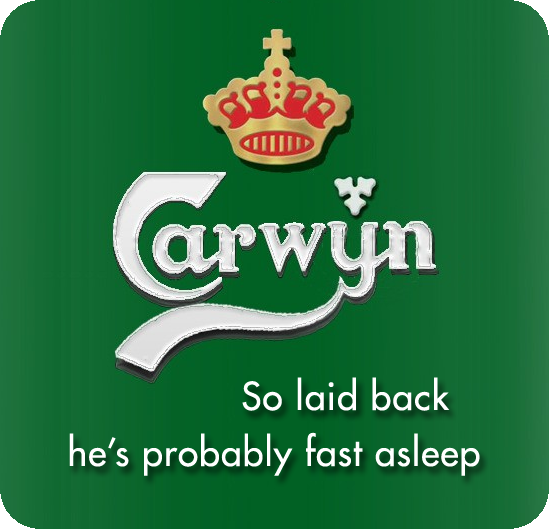
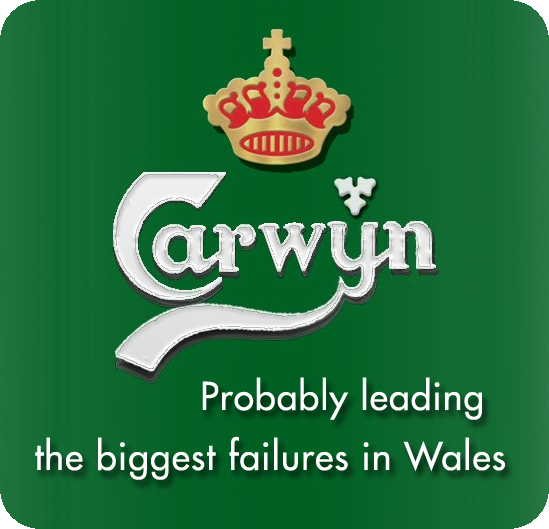
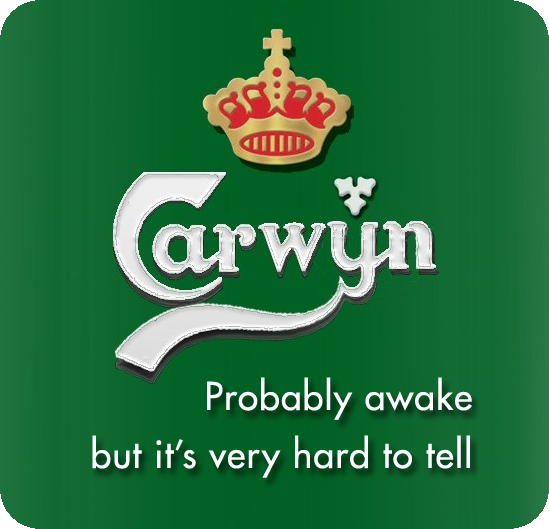
If any of you are going out for a well-earned drink tonight, these special election beermats might well come in handy:



This is just about the best poster I've seen explaining why AV is fairer than the current FPTP system we use to elect MPs.

If you want to watch the longer explanation it was based on, it's in this video.
I was amused by this short paragraph in today's Western Mail:
Last year’s poor showing for Wales in the Pisa (Programme for International Student Assessment) tables on literacy and numeracy led to Education Minister Leighton Andrews calling for major improvements in school standards.
We have to admire that brave Mr Andrews, calling for major improvements in school standards when nobody else in Wales was at all concerned about what the PISA results had shown.

Meanwhile back in the real world, rather than a distorted mirror image of it, pretty much everyone in Wales was concerned about our poor showing in the PISA tables ... and in fact, most of them were calling for Leighton Andrews to do something about it.
Yes, I know that's completely unreasonable. Why should it have anything to do with the Minister for Education? When under pressure, start pointing the finger of blame at everyone but yourself. Anybody would think there was an election on.
This is the third in my series of analyses for the five electoral regions of Wales, following South Wales West and South Wales Central. In 2007 the result was:
South Wales East
Constituencies
1 Blaenau Gwent
2 Caerffili
3 Islwyn
4 Merthyr Tudful & Rhymni
5 Monmouthshire
6 Newport East
7 Newport West
8 Torfaen
Regional seats
1 Plaid Cymru
2 LibDem
3 Conservative
4 Plaid Cymru
The eight constituency seats were all held by Labour with the exception of Tory Monmouthshire and Blaenau Gwent, held by Trish Law as an independent affiliated to Peoples Voice. Two of the regional seats were won by Plaid, although one of these was lost to the Tories when Mohammad Asghar defected in 2009. Of the other two regional seats, one was won by the LibDems and one by the Tories.
The Constituency Vote
Monmouthshire is, and is certain to remain, rock solid Tory.
In Blaenau Gwent Trish Law is standing down, and even though Jayne Sullivan is standing as an independent with her backing, Blaenau Gwent seems certain to revert to Labour. Alun Davies ran a typically vicious personal campaign when first selected for the seat, but after Trish Law announced she was standing down he realized he no longer needed to.
The two Newport seats were not entirely comfortable wins for Labour. In Newport West the Tories ran them close with 34.6% of the vote to Labour's 40.5%, and in Newport East the LibDems got 27.6% to Labour's 32.0%. But because of the current ConDem coalition in Westminster, the share of the vote for each of these two parties is likely to go down, meaning that Labour should hold both without too much trouble.
The three remaining seats were all marked by strong showings from independents, but won by Labour. Merthyr Tudful and Rhymni had a total of five independents who between them collected 30.3% of the vote. It's a perfect illustration of why we would be better off with AV, because these candidates split the vote and allowed Labour an easy win. In Islwyn Plaid got a strong 21.6% of the vote, and because no independent is standing this time round our share of the vote should go up, but it still won't be enough to beat Labour.
-
The really interesting seat in this region is Caerffili. Plaid got 25.8% of the vote behind Labour's 34.6%, a margin that in itself would make this seat one of Plaid's main targets; but because the person who was standing as an independent is now Plaid's candidate, it has become a seat that Plaid should expect to win.
Ron Davies got 22.2% of the vote as an independent, and adding the two percentages together gives 48.0% ... which would beat Labour comfortably. But is it reasonable to add them together? My answer is yes. Plaid's core vote last time is going to remain largely intact, though subject to the same swings common to the rest of the country, of course. The question is whether Ron's own personal vote will stay with him. Fairly obviously those who turned against him because he was no longer in the Labour party had already done so in 2007, which indicates that they are more impressed with his personal qualities than his political affiliation. These people will not switch back to Labour. So it is only those who would rule out voting Plaid in any circumstances that will turn away from him now. Some of his 22.2% may feel that way, but it certainly won't be half.
So I think Ron Davies will make it, though it will be tighter than it otherwise would be simply because Labour are riding high in the national polls. It will be good to see him back, for the Assembly does not have that many heavyweights.

The Regional Vote
These are the details of the regional vote in 2007. Seats are determined by the percentage of the vote on the second ballot paper, but seats already won at constituency level are taken into account. After a seat has been won, the percentage necessary to win another seat is the original percentage divided by two, then three, then four, etc.
Labour ... 38.4%
Conservative ... 21.4%
Plaid Cymru ... 14.6%
LibDem ... 11.8%
UKIP ... 4.9%Round 1 ... Labour 38.4% ... already won
Round 2 ... Conservative 21.4% ... already won
Round 3 ... Labour 19.2% ... already won
Round 4 ... Plaid Cymru 14.6% ... regional seat 1
Round 5 ... Labour 12.8% ... already won
Round 6 ... LibDem ... 11.8% ... regional seat 2
Round 7 ... Conservative 10.7% ... regional seat 3
Round 8 ... Labour 9.6% ... already won
Round 9 ... Labour 7.7% ... already won
Round 10 ... Plaid Cymru 7.3% ... regional seat 4
This time around, the regional vote is going to be enormously hard to predict. Having spent many an hour looking at the spreadsheets, it looks like the final regional seats will be decided on very small percentage differences at around 6.5%.
What we can say with relative confidence is that the LibDems will get one, but only one, regional seat. It actually doesn't matter too much what their percentage share of the vote will be, because it can't possibly be more than 12% and won't be less than about 7% ... and anywhere in that range will get them one seat. Newport East and to a lesser extent Merthyr have a good core level of LibDem support which will stop them falling too far.
A few months ago I had thought that Plaid would at least break even, either holding our two regional seats or winning Caerffili and holding one regional seat. I'm not so sure about that now, but we are able to win a total of two seats in two different ways.
If Plaid win Caerffili, then either of these two things needs to happen to get one regional seat:
• to get more than twice the regional vote of UKIP
• to get more than two-thirds of the regional vote of the ToriesBut if we lose Caerffili, both of them need to happen to get two regional seats.
We could scrape it if we get about 13% of the vote. This would be down on our 2007 showing of 14.6%, but not disastrously so. We have solid core support in Caerffili and Islwyn, and this should help to keep any fall lower than it would otherwise be.
UKIP are an unknown quantity, and I've never been convinced that those who want to get rid of the Assembly will ever be motivated to get out and vote in Assembly elections. They might say they'll vote UKIP at home on the phone or sitting in front of their computers, but I think they will stay there on polling day. What's the point of voting to get rid of something that all five electoral regions of Wales have just voted to enhance by an overwhelming margin? So although the latest poll puts them at about 8%, I'd expect them to get more like 6.5%.
There's no doubt that the Tories will be down on their 21.4% showing in 2007, but the question is by how much. I think it will be less than the polls suggest because of their core support in Monmouthshire and Newport West. This might also be bolstered by people who would not normally vote in an Assembly election, but who vote Tory in Westminster elections, turning out to vote No in the AV referendum. My guess is that the Tories will get about 19%.
-
Now if these share of the vote predictions for Plaid, UKIP and the Tories are right, it means that there will be a very tight three-way battle for the third and fourth regional seats if Ron Davies wins in Caerffili, or for the fourth regional seat if he doesn't. Although the actual percentages are different, they each boil down to a figure of around 6.5% when divided to take account of the seats already won:
Half of Plaid's 13% ... vs ... all of UKIP's 6.5% ... vs ... a third of the Tories' 19%
One thing is obvious: Plaid's chances of getting two seats in total will be better if we win Caerffili. However this is not just because of the extra seat that will be available. The beauty of the situation is that it will be a fight between one party on the left and two parties on the right, so people with views on the right of the political spectrum will have to choose between the Tories and UKIP. Therefore if we win Caerffili, it wouldn't matter if one of the two does better than Plaid; for what one right wing party gains, the other right wing party will lose ... and that will leave Plaid with, at worst, the fourth regional seat.
Given a choice between them, I hope UKIP wins. A UKIP AM continually sniping against the Assembly will tend to make the three other unionist parties more united in favour of further devolution for Wales. And from Plaid's point of view, we hardly want the Tories to become the second largest group in the Assembly at our expense.
However if we don't win Caerffili, we will easily win the first regional seat with 13% of the vote, but this will mean that there is one less seat to fight over at the 6.5% level. Plaid would only then get the final regional seat by getting more than twice UKIP's vote and more than two thirds of the Tories' vote. So Plaid need to fight hard, for if we win Caerffili it is possible for Jocelyn Davies to lose her seat. She has shown herself to be a competent and determined deputy minister, and it would be a great shame to lose her.

The Prediction
If I were more cautious, I wouldn't dream of predicting the overall result in South Wales East. But seats are not won by being cautious, so this is my prediction:
• Ron Davies will win Caerffili for Plaid; the Tories will win in Monmouthshire; and the six other constituency seats will be won by Labour.
• The LibDems and Tories will win the first two regional seats, and it doesn't matter which way round. The two remaining regional seats will be won by Plaid and UKIP.
Rather like watching a documentary on dinosaurs, two lumbering beasts clashed horns. One was the Labour Party, moribund from years of being unchallenged at a local level. The other was the Labour Party, shorn of all the values and ideals that made it what it was, with a bright shiny new leader determined to remould it to reflect the moral values of the new age ... or in other words, Thatcherism.
In most places the fight was over before it had begun. Labour's new values prevailed; for in order to become electable, the Labour Party had no choice but to adopt the values of middle England, and Labour MPs either changed their values to suit or were replaced by candidates with those new values. But in some remote valleys where Labour votes were weighed rather than counted, the hierarchy of the old beasts still held sway. Peter Law would not stand aside in favour of a candidate parachuted in from middle England. He stood as an independent, won, and Peoples Voice was born.
In terms of policies and ideas, People's Voice didn't have many. Those who were elected—Peter and then Trish Law, and Dai Davies—were probably just "more Labour than Labour" and were elected more for their hearts being in the right place than for having any distinctive policy platform. For me, the one good idea that stood out was a proposal to make public transport free ... it was lifted from the Scottish Socialist Party, but no less good an idea for that.
-
Meanwhile the bright shiny Labour Party simply carried on regardless; even though the shiny bits got tarnished and rusty, some bits fell off and had to be replaced, and the well oiled machine ended up looking like a collection of spare parts with only a trace of anything human remaining. How could one AM or one MP hold out for long? They didn't, and on Thursday next week the assimilation of Blaenau Gwent into the collective will finally be complete. Resistance was futile.
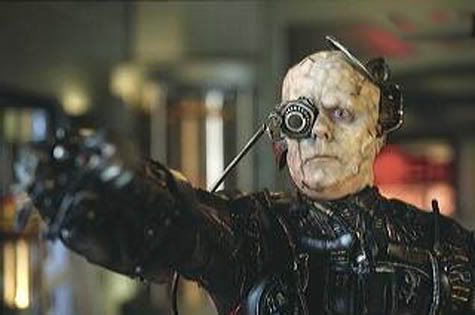
Apparently Labour are going to change things in Blaenau Gwent so that any future displays of independent thinking will be crushed before they get a chance to develop. They've started with the name; it is now going to be known as the Blaenau Organized Regime, Gwent. They strongly deny that the BORG will become one of the greatest threats mankind will ever face.
Today is the 25th anniversary of the Chernobyl nuclear disaster, and harrowing though it is, it is worth looking again at the Independent's photo essay on the aftermath from last year. These are a just a few of the shots from it:
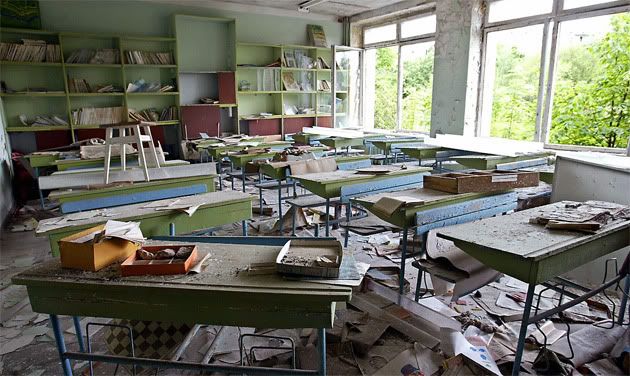


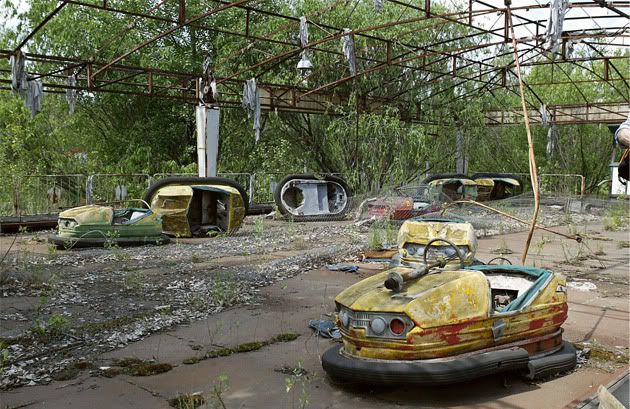
I certainly don't want to be sensationalist, nor do I want to overstate the dangers of nuclear power. My position has always been that the risks are low, provided that we spend very large sums of money on strict safety regimes.
Nevertheless, even with a such safety regimes, the risk can never be zero. We have to consider not just the level of risk of an accident, but the seriousness of the consequences if one happens. For example, if I walk on top of a two foot high wall around a flower bed in the local park on a clear, calm day, it's very unlikely that I'll fall off, and the worst that could happen if I did is that I would sprain an ankle. If I walk on top of an equally wide parapet wall at the top of a ten story building overlooking that park, the risk of me falling is exactly the same, but the consequences of falling are very much more serious. I might do the first, only a fool would do the second.
-
As Wales can easily produce all the energy we need from renewable sources, it is foolish for us to spend huge sums of money on nuclear, not least because we will have to keep spending it for hundreds of years after any nuclear power station has stopped producing electricity. Nor can we rely on the companies concerned to pay for the clean up afterwards; companies can go bust ... especially when they are no longer making money because no more electricity is being produced. Our children, our grandchildren and generations to come will then be left to pay for the problem of any nuclear power station we allow to be built in Wales.
There's a political dimension to this story, which I'll save for later. But as this article in today's Western Mail reminds us, our farming industry is still suffering the consequences of Chernobyl. And as this story only last week from Belgium illustrates, the radioactive cloud might well have claimed several victims of cancer even there.
Following my analysis of the constituency and regional seats in South Wales West a few weeks ago, here is my long overdue analysis for South Wales Central.
South Wales Central
Constituencies
1 Cardiff Central
2 Cardiff North
3 Cardiff South & Penarth
4 Cardiff West
5 Cynon Valley
6 Pontypridd
7 Rhondda
8 Vale of Glamorgan
Regional seats
1 Plaid Cymru
2 Conservative
3 Plaid Cymru
4 Conservative
Six out of the eight constituency seats are currently held by Labour, but the LibDems hold Cardiff Central and the Tories hold Cardiff North. Plaid Cymru and the Tories each have two regional seats.
The Constituency Vote
It is very hard to see Labour losing any of the seats they hold. But strange things have happened in politics before, and some strange things are happening at the moment in Pontypridd. In the 2007 election Labour got 41.8% of the vote with the LibDems in second place with 27.6%.
Given the general fall in the popularity of the LibDems as a result of them being in coalition with the Tories in Westminster, you'd expect Labour to feel safe; but they are clearly rattled by the tactics of the LibDem candidate, who they are accusing of harassment. One thing we should know from previous elections is that the LibDems are not above, what shall we say, "robust" local techniques. But having complained six times before and had each one dismissed, to do it again does appear to be an over-reaction. It's very unlikely, but Labour might just succeed in throwing this seat away.
Plaid Cymru did relatively well in Rhondda and Cynon Valley last time with 30.1% and 27.9% of the vote. But in both seats Labour were comfortably in the upper 50s and should therefore be safe.
-
The two interesting seats are Cardiff Central and Cardiff North. In 2007 Cardiff Central was won by the LibDem's Jenny Randerson with 51.8% of the vote, way ahead of Labour with 21.9%. She is not standing this time, and the LibDem candidate is Nigel Howells. The two factors against him are that he is less well known (though he is a Councillor) and the general drop in support for the LibDems. The two factors in his favour are the previous margin of victory and the fact that the LibDems can fight very intense and effective local campaigns even when their national showing is poor.
In reality the result actually matters much more to Labour than it does to the LibDems. For Labour, their only chance of winning a majority in the Assembly is to win more constituency seats. They cannot win any list seats in any of the three south Wales regions. But if the LibDems lose this seat, they do stand a chance—though no more than a chance—of picking up a regional seat instead.
This means that those who don't want to see Labour win a majority are going to have to vote tactically for the LibDem candidate, even if it means holding your nose as you do it. This is especially true for those who would normally vote for Plaid, the Greens or the Tories. If the LibDems win this constituency, it means that they will win one fewer regional seat than they could otherwise win ... and that seat will then go to either Plaid, the Tories or the Greens. It is a no-brainer. If you live in Cardiff Central and would normally vote Plaid, Green or Tory, you would be mad not to vote LibDem for the constituency, and then for your preferred party in the regional vote.
-
The scenario is almost exactly the same in Cardiff North, though not quite. Jonathan Morgan won this seat for the Tories in 2007 with 45.3% of the vote, with Labour second on 30.9%. That margin would be safe enough in most circumstances. Factors in Labour's favour are that it is a smaller margin to overcome than in Cardiff Central and the relatively high profile of Julie Morgan, who used to be the MP for this seat until she lost it to the Tories this time last year.
Factors against Labour are that Julie Morgan will be 67 years old this year, and with this term set to last for five years rather than the normal four, some might well ask why she has not taken the opportunity to join husband Rhodri in a happy retirement. The answer is probably that only someone with her profile could hope to beat Jonathan Morgan. Yet it does beg the question of how short people's memories are. Can people in Cardiff North really have forgotten why Gordon Brown's party was voted out of office in Westminster? And do people really think that the cuts in our block grant now would have been at all different if Labour were still in power? Labour are blaming the Tories for what they would have had to do anyway.
The consequences for the regional vote are slightly different in this seat. The Tories currently hold two regional seats as well as this constituency seat. If they lose Cardiff North it is all but impossible for them to win a third regional seat to make up for it. If you're a Tory, this makes it all the more important that you hold onto this seat, and the Tories are and will be putting a lot of their energy and resources into keeping it.
Yet the result will also matter for Plaid, the LibDems and the Greens; for although the Tories will not gain a regional seat if they lose this constituency, there is a very real chance that they will still lose a regional seat even if they hold it. But if they lose Cardiff North, then they will almost certainly hold on to their two regional seats. This means that it is absolutely vital for supporters of these parties who live in Cardiff North to vote Tory; for doing so actually increases Plaid's chance of holding on to our two seats, and increases the possibility of the LibDems or the Greens winning one.
I certainly don't underestimate how hard it will be for people who hate the Tories (or at least strongly dislike their policies) to vote Tory. But it's going to be a tight contest, with the bookies currently showing Labour slightly ahead; so we need to make it clear that voting tactically for the Tories will help the chances of your first choice party. Doing it will feel like a betrayal of all your principles, but it really is the best way of both helping your own party and of preventing Labour from getting an overall majority.

The Regional Vote
Now let's turn to look at the way the regional vote works in more detail. Seats are determined by the percentage of the vote on the second ballot paper, but seats already won at constituency level are taken into account. After a seat has been won, the percentage necessary to win another seat is the original percentage divided by two, then three, then four, etc. This is how things worked out in 2007:
Labour ... 36.7%
Conservative ... 23.4%
Plaid Cymru ... 16.7%
LibDem ... 15.7%Round 1 ... Labour 36.7% ... already won
Round 2 ... Conservative 23.4% ... already won
Round 3 ... Labour 18.3% ... already won
Round 4 ... Plaid Cymru 16.7% ... regional seat 1
Round 5 ... LibDem ... 15.7% ... already won
Round 6 ... Labour 12.2% ... already won
Round 7 ... Conservative 11.7% ... regional seat 2
Round 8 ... Labour 9.2% ... already won
Round 9 ... Plaid Cymru 8.3% ... regional seat 3
Round 10 ... Conservative 7.8% ... regional seat 4
The most important point to note is that Labour, because of the seats already won at constituency level, have absolutely no chance of winning a regional seat. Even if Labour were to lose Pontypridd this time round and fail to win both Cardiff Central and Cardiff North, they would still have no chance whatsoever of winning a regional seat. This means that a regional vote for Labour is a completely wasted vote. Labour supporters should instead vote for the party they rate second after Labour.
For Plaid supporters in South Wales Central, it is the regional vote and only the regional vote that matters. This may sound obvious, but people would be surprised at how many voters vote for their first choice party at constituency level, but think that they should give their regional vote to a second choice party. Labour supporters should do this in all three of the south Wales regions, but not Plaid supporters.
-
Predicting the results this time round will depend on the percentages each party gets and whether they have won a constituency seat. Much as I hate to say this, the order is probably going to be Labour (because most of their supporters won't realize that they are wasting their vote, and Labour certainly won't tell them that they are) followed by Plaid and the Tories neck-and-neck, the LibDems, and then the Greens and UKIP neck-and-neck.
With that order, and excluding the Labour vote because it is irrelevant, Plaid will hold onto their two regional seats if any of these things happen:
• They get more of the vote than the Tories
• They come second to the Tories, but the Tories hold Cardiff North
• They come second to the Tories and the Tories lose Cardiff North; but Plaid get more than twice the votes of any other party
• They come second to the Tories and the Tories lose Cardiff North; but the LibDems hold on to Cardiff Central
I'm pretty confident that one of these four things will happen, so our two seats will be safe.
After that, things get more complicated, and perhaps too complicated to list. The Tories stand a chance of holding on to their two seats, even if they hold Cardiff North; and if the LibDems lose Cardiff Central they might not win a regional seat to make up for it.
-
As for the Greens, they reckon South Wales Central is their best chance of winning a seat. I've got a lot of respect for most Green policies and would like to see them pull it off, but it's a big ask.
The only way they can do it is if the LibDems hold Cardiff Central and the Tories hold Cardiff North, as this effectively moves them up two steps. But they would also need to get all three of these things as well:
• more votes than UKIP
• more than half the vote of the LibDems
• more than a third of the vote of the Tories, or more than half the vote of Plaid
The latest YouGov poll shows Plaid on 18%, the Tories on 14%, the LibDems on 7%, and both the Greens and UKIP on 4%. I think that probably puts the Tories too low, yet if the Greens can get 5% then they will win the fourth seat providing the LibDems get less than 10% and the Tories get less than 15%. If they can make it to 6% then they will get the fourth seat if the LibDems get less than 12% and the Tories get less than 18%. That's well within the realms of possibility.
Because supporters of the other parties besides Labour should all vote for their first choice party on the regional ballot, everything will depend on those Labour supporters who are aware enough to realize that it is pointless for them give their regional vote to Labour. For their vote to count, they have to give it to their second choice party, and it's safe to guess that they will be much more inclined to vote either Plaid or Green, as these are the other left-leaning or—as Labour would say—progressive parties. Even if only some of that Labour switch goes to the Greens, it should be enough to get them a seat.

The Prediction
So now for my final prediction. I reckon that Labour will hold onto their six constituency seats; that the LibDems will hold on to Cardiff Central by a reduced but still comfortable margin; and that the Tories will just, but only just, hold on to Cardiff North.
Plaid will hold their two regional seats, irrespective of whether they come ahead of or behind the Tories; but the Tories will lose one of their two regional seats to the Greens.
I'm pleased to announce that Huw Lewis has stepped onto centre stage to pose for the next poster in the campaign to highlight just how well Labour has been "standing up for Wales".
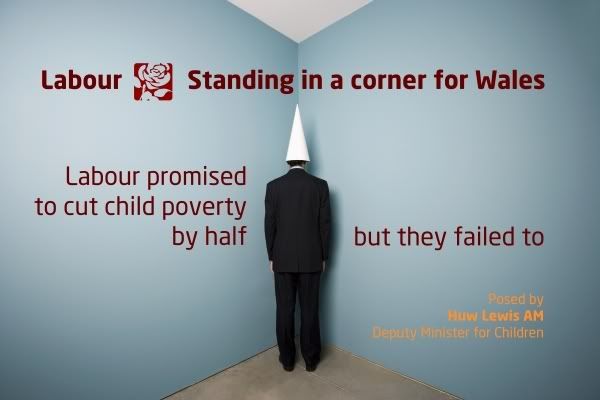
Postcard | Hi-res image | PDF
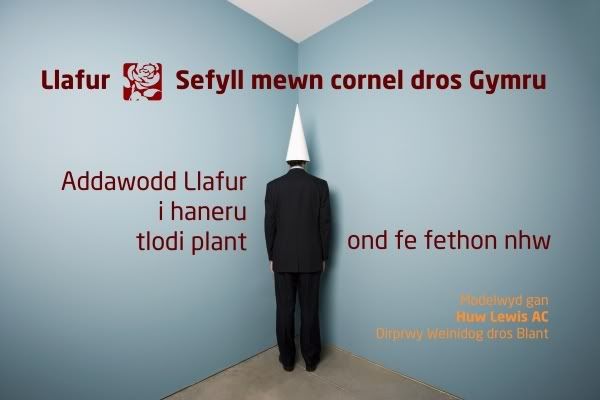
By any standard, the failure to cut child poverty levels has been the worst of all Labour's failures. A party that used to pride itself on standing up for those who are less well off conveniently managed to forget all those values when in power. Instead it pandered to the rich, allowed (in fact encouraged) its new friends in big business and the financial institutions to become even more filthy rich, and hoped against hope that some of this money would somehow trickle down to the less well off in our communities.
But their blind trust in the free market economy—and of course they made it more free by not adequately regulating the financial institutions—not only failed to make an impact on child poverty before the credit crash, but brought us all to the brink of ruin when the results of that failure to regulate hit home.
-
So why is Huw Lewis in the spotlight for this? Dear old Screwloose is a good example of someone whose heart is probably in the right place. There are all sorts of things we can do to alleviate the worst effects of poverty for children in Wales. But the bottom line is that poverty is a matter of money. It is a question of how we as a society create wealth and how we distribute that wealth fairly.
Labour have done nothing for Wales in that respect. Relative to the rest of the UK Wales is progressively getting even poorer, and no amount of spending money on special programmes or placing new responsibilities on local authorities and other bodies is going to do any more than make a small dent in the problem. To make a real difference we must also take the levers that control the Welsh economy into our own hands.
But Welsh Labour are absolutely terrified of taking any sort of responsibility for things like taxation and the benefits system in Wales. This is all the more surprising because having an Assembly with taxation powers has consistently been the most popular model of governance in the annual St David's day poll [see here], and because 60% of people in Wales think that the Welsh Government should have control over the benefits system, with only 23% thinking it should remain in the hands of the UK government [see here].
-
There's only one conclusion we can draw from this: Labour are great at spending money on programmes, but are absolutely clueless when it comes to turning Wales into a more prosperous country. It is only by taking the levers of the economy into our own hands that we will have any hope of putting an end to child poverty in Wales.
Hat tip to Siônnyn for finding this picture.

Who said being able to count to three or four was too much for the average voter?
Thanks to Ffranc Sais, who I have to say is one LibDem blogger who generally has something interesting to say, I looked at this story in the Daily Post:
Former Deputy Chief Constable slams plans for Police Commissioners
A former deputy chief constable of North Wales yesterday warned plans to appoint Police Commissioners could take policing back two centuries “to political partiality.”
And Bill Brereton added he was concerned at proposals to devolve policing to the Assembly and would argue the case against it ...
“I am also concerned at proposals to devolve policing to the Assembly – I do not think that is right and will argue the case against it strongly.”
The first part is fair enough. I don't like the idea of elected Police Commissioners either, and I hope we are able to avoid having them imposed on Wales. Devolving responsibility for policing to Wales would be the best way to ensure that it doesn't happen ... though Labour haven't quite managed to work out that blindingly obvious fact for themselves yet.
This Bill Brereton is in fact the LibDem candidate for Wrecsam in the forthcoming Welsh general election. Yet the LibDems say they are unequivocally in favour of devolving responsibility for the police to Wales. This is again from the Daily Post, only ten days ago:
Plaid Cymru and Lib Dems want control of police in Wales
The Welsh Liberal Democrats said that the party had consistently called for the strengthening of devolution and argued the case for the devolution of policing and criminal justice in its last Assembly election manifesto.
“We shall remain committed to that proposal when our manifesto is published shortly. It remains ludicrous that an issue so crucial to local communities is still governed from Westminster.”
And indeed that commitment is in their manifesto:
We will make Welsh communities safer for everyone by ... continuing to press for the devolution of policing and justice by producing evidence to support the case. Devolution of policing could allow for better, Welsh solutions to Welsh problems.
That's a very welcome commitment, of course. Therefore we have to ask why the LibDems have chosen a candidate who intends to do the exact opposite of what it says in the manifesto he's standing on. How on earth did he get selected? But more importantly, how on earth can the LibDems expect anyone to take what they promise to do in their manifesto seriously?
At least there's a silver lining ... he has absolutely no hope of being elected. Let's make that true of every other LibDem who's standing on 5 May.
One of the reasons I include David Jones on my bloglist is for entertainment value. He can be guaranteed to say something that will make him look a fool.
Today he blogged about AV, telling us about an encounter he had while canvassing:

In Mountain View Avenue, Mynydd Isa, I stopped to chat with a gentleman who was creosoting his fence. How, I asked, did he feel about AV?
“Disastrous,” he replied. “Do you realise that if we’d had AV at the last general election, that [expletive deleted] man Gordon Brown would still be running the country? It doesn’t bear thinking about.”
I must confess that the possibility hadn’t occurred to me, but it is probably the most compelling argument against the Alternative Vote system I have yet heard.
At this point, it might be worth reminding people about this story from the Telegraph in February:
David Cameron: Gordon Brown would still be prime minister under AV
Poor David. Caught lying through his teeth. He's hardly the sharpest tool in the box, but not even he could be as dumb as he likes to make out he is.
Now if we read the article, what his leader said at the time was that under AV, Labour could have stayed in power. Sure. And my next door neighbours on both sides could each have won the lottery.
It would be very hard to work out what the results of a previous election would have been if AV had been used. You'd need to know if a person's expressed choice was their first preference or whether s/he was voting tactically; you'd need to know what their other preferences were; and also to know who else might be standing as a candidate, because one advantage of AV is that it would enable a wider range of candidates to stand because there would be no danger of them splitting the vote.
-
So then, what is the very worst thing about AV, I hear you ask?
Simple, that the mere mention of it encourages those who have a vested interest in maintaining the current voting system to tell even bigger lies than they normally would.
I was intrigued by this taster in today's Western Mail:

Currently studying at Harvard University in America on a prestigious Kennedy Scholarship, Mr Price has researched the comparative economic performances of large and small states.
In an article for the Kennedy School Review called “Small Is Cute, Sexy, and Successful: Why Independence for Wales and Other Countries Makes Economic Sense”, he argues that the widely expressed view that small nations fare worse economically is incorrect.
He writes: “My own analysis, carried out with the help of fellow student Ben Levinger, confirms [research carried out in France]. Using World Bank data, we found that small European Union countries – those with fewer than 15 million people – enjoyed a 50% increase in exports per capita between 2000 and 2008, compared to a 35% increase for larger states.
So despite the rather dubious title, I read the article itself, which is here:
Small Is Cute, Sexy, and Successful
Why Independence for Wales and Other Countries Makes Economic Sense
It's only a short read, and I'll leave people to do that for themselves. But I'd like to extract one thing from it, on the principle that a picture paints a thousand words.
This graph shows that Wales would be a lot richer as an independent state rather than as part of the United Kingdom.

Many politicians would cut off one of their body parts to win the support of one of Rupert Murdoch's papers. I'm not sure whether Alex Salmond has gone that far, but the Scottish Sun has today backed him as its choice to remain First Minister of Scotland.
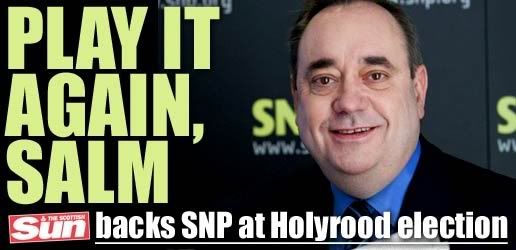
I would simply let the paper do a complete U turn on its policy for the election in 2007. Whether they support him or not is entirely up to them, and I would advise Salmond to keep his distance and "treat those two impostors just the same".
After all, the Sun's condemnation did not stop him becoming First Minister in 2007, so will the same paper's support now really make a difference? It's probably better to conclude that the Sun is following public opinion rather than forming it.

But then why has Alex Salmond allowed himself to be pictured holding the paper? I think it's a mistake. It implies that he is in thrall to the Scottish Sun rather than the other way round. It makes him appear as ridiculous as Lembit Öpik did in his flirtation with the Daily Sport.
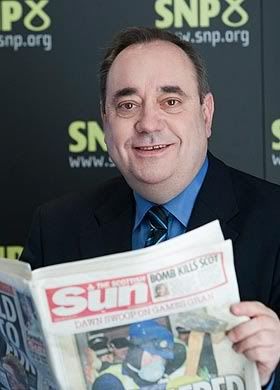

Who knows, this might have the effect of reducing rather than enhancing the SNP's prospects ... and who knows, this might be exactly what Murdoch intended.
I've thought hard about whether I should write this post or not, but in the end have decided to do so because politics should always be about principle, and a party that compromises its principles should not be surprised if it loses votes as a result of being afraid to say what it believes and why.
Plaid is a party that has long opposed nuclear power and remains opposed to nuclear power. So I have to say that I am ashamed that Plaid's manifesto makes no mention of this. It is particularly galling because other parties fighting this election are not afraid to make their position clear.
The Greens say:
We can get all of our energy from clean renewable sources, we do not need dangerous nuclear power.
We would ... Phase out nuclear power and resolutely oppose any new nuclear power stations. Stop any further investment in new coal-fuelled power stations.
The LibDems say:
We will lead a green revolution in Welsh energy supply by ... issuing a formal statement that the Welsh Government supports renewable and community energy projects as a priority and opposes new nuclear power both because of its detrimental impact on human health and its long-term unsustainability. We will also oppose new carbon-based power that does not have appropriate capture and storage built in.
Here are two parties making clear statements against nuclear. But to see a party I support largely, though of course not only, because its green credentials are second only to those of the Green Party itself failing to make a clear statement against nuclear in its manifesto is simply not good enough. It's not good enough because the manifesto that a party fights any election on is more important than what is contained in a policy statement somewhere else. A manifesto is the party's contract with the electorate, and the public are entitled to hold each party to account for what they choose to put in it.
-
Now I do accept that a manifesto is a short document that cannot include every detail of every policy. But it could and should refer to where that detail can be found. Labour's manifesto for this election provides a good example of how to do this. It says:
The Assembly Government's Low Carbon Energy Statement sets out how we intend to maximise energy savings and energy efficiency, making the majority of the energy production we need in Wales from low carbon sources.
And if we turn to that document, it says:
Our approach to nuclear power in Wales is ... we remain of the view that the high level of interest in exploiting the huge potential for renewable energy reduces the need for other, more hazardous, forms of low carbon energy and obviates the need for new nuclear power stations.
I hardly need to remind anyone that Plaid Cymru was a part of the One Wales government that produced this statement. Yet if Labour can refer to a clear statement that Wales does not need new nuclear power stations, it makes it all the more amazing that Plaid Cymru does not.
However one thing I do find interesting is that Labour has changed its position from the one it held in the 2010 election to Westminster. Labour's manifesto for that election did include unequivocal support for new nuclear power:
• We will make Wales a leading provider of green energy, produced not only by wind, but also from biomass, marine and microgeneration. This will not only combat climate change but generate thousands of new jobs, for example through Anglesey's vision of an 'energy island' with offshore wind and other industries located there, and construction of the Wylfa B Nuclear Power Station which Labour fully supports.
I pointed out at the time that this was a direct contradiction of what the Welsh Government had said in its Low Carbon Energy Statement, a document which had been published only a few weeks beforehand. This, of course, is a sign of the deep divisions between the Peter Hain and Carwyn Jones factions in the party. If I were an optimist, I could say that the fact that Labour's previous support for Wylfa has been dropped from the Assembly manifesto is a sign that the Peter Hain faction was losing. But the realist in me knows full well that Hain and Jones are simply playing out the roles of "hard cop" and "soft cop". It is one thing to make a manifesto commitment, but quite another thing to be credible when making it. When a party flip-flops on an issue, people are bound to ask whether they will flip, or flop, again.
-
Nonetheless, so far as Plaid is concerned, the uncomfortable fact remains: we have allowed three other parties to present themselves to the public in this election with better statements on nuclear power than us.
I am not one to talk often about "sending a message" because the phrase is normally used as some sort of code to criticize or support a policy that has only marginal relevance to something else. But a party manifesto is all about sending a message, because it is a document in which a party sets out what it considers to be important. That means that the public have every right to conclude that anything not mentioned in it is of no, or of very little, importance to that party.
-
It is no secret that Plaid Cymru has a leader who is at odds with his party on the matter of nuclear power. To an extent that is acceptable ... but only to an extent. Let me set out what those limits should be.
It is obvious that in all parties there will be agreement and disagreement about some things, with not every member agreeing on every aspect of policy. That is healthy. But to me it is fundamental that a party decides policy through its membership and organizational structure, for the only alternative is for the leadership of the party to dictate what its policy should be. I'm glad that Plaid is not that sort of top-down party; but the inevitable consequence of being an open, democratic party is that there will be some subjects on which a prominent member is at odds with the majority of his or her party.
However we go beyond what is acceptable when we try to brush a policy under the carpet simply because our leader happens to disagree with it. And that is exactly what Plaid Cymru has done on this issue.
I'm sure that Ieuan Wyn Jones might consider it something of a success that he has managed to get this policy quietly dropped from the manifesto. But it is a hollow victory that I think he will come to regret, because it will lose us far more votes than we could hope to gain. For in the eye of the public what loses votes is not so much whether you hold one policy or the other; what loses votes is for a party to be two faced on an issue of principle.
Apparently Peter Hain was furious that Leighton Andrews was the first Labour politician to feature in the new poster campaign highlighting Labour's performance during their time in government.
Peter is of course a very important person, and all the frantic emails and phone messages from him and his staff couldn't be ignored. So we are delighted to announce that he was able to take some valuable time away from his personal tanning parlour and step into the studio for the latest poster in the series.
Demand is running high, but you can download a postcard size image to put on your blog or website and email to your friends, or a high resolution image or pdf to print out and display.
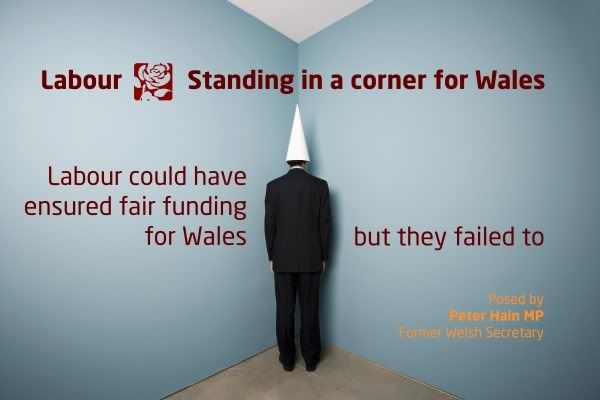
Postcard | Hi-res image | PDF
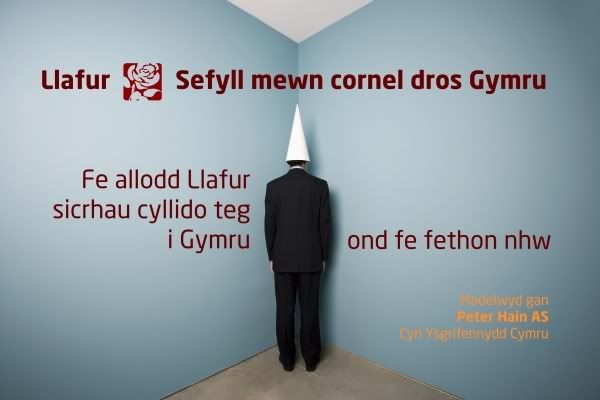
I'm sure that many other prominent Labour politicians will want to have their moment in the spotlight too. So please get in touch to book an appointment.
At the start of the Welsh Conservative manifesto for this general election, David Cameron writes a personal introduction in which he says:
Over the last four years, Welsh Conservatives have travelled the length and breadth of Wales and seen first-hand the difficulties many people face. We’ve met parents, patients, students and workers who are rightly angry at the way Labour continues to run this proud nation down. We’ve fought your struggles in opposition.
I suppose the Tories want us to be grateful for small things. Cameron seems to be saying that before he became leader, Welsh Tories didn't travel the length and breadth of Wales or see anything first hand.
But I suppose there is a rather more realistic way of looking at it: namely that his claim to have seen these difficulties at first hand is as convincing as his claim to be Welsh.
-
In complete contrast, if we search through the Tory Manifesto for Scotland, here, David Cameron isn't mentioned once. That can only mean that Tories in Scotland know full well that any mention of Cameron is likely to cost them votes.
Yet in Wales, where they must surely know the same, the poor Welsh Conservatives are kept on an even tighter leash by their masters in Westminster than Welsh Labour is. Their original Welsh manifesto was apparently called in at the last moment, and all traces of the party in Wales having "gone native" expunged from it. It shows.
So even though I don't have much time for Tory policies, I have to say that I feel a little sorry for Nick Bourne as a person. For he's meant to be the leader of the Welsh Conservatives, but gets relegated to third place while both David Cameron and Cheryl Gillan take the spotlight. Yet his counterpart in Scotland, Annabel Goldie, gets top billing with no mention of Cameron at all. If we're looking for a reason why the polls show Labour streaking ahead in parts of Wales where they could expect to be challenged by the Tories, this might be part of the explanation.

Today's prize for the biggest whopper must go to the Policy Officer for the Liberal Democrats in Wales, Ben Lloyd. In an article on Waleshome he says:
When I started secondary school, in 1997 in Powys, there was barely a measureable spending gap between my school and those over the border in Herefordshire. When my sister took her GCSEs in the same school in 2009, that gap had risen to over £500. It has escalated to £600 since then.
We can read the figures for educational spending per child in 2009/10 for both Powys and Herefordshire in this document.
• Herefordshire spent £5,961 per child
• Powys spent £6,101 per child
Yes, Powys actually spent £140 per child more than Herefordshire, not £600 less.
So we have to wonder just what point the LibDems are trying to make. They want to suggest that education problems in Wales can be solved by simply spending more money. Maybe £600 per child more, maybe £2,500 per child more. But much smaller sums of money could be spent much more wisely by effectively targeting poor literacy ... and, as the LibDems demonstrate perfectly, poor numeracy.
I didn't think yesterday's story about a hotel on Ynys Môn trying to prevent its staff from speaking Welsh would have been of much interest to the UK Prime Minister, but it looks as if I was wrong.
It was refreshing and long overdue to hear him condemn the attitude of immigrants who refuse to either integrate or learn to speak Welsh:
I only wish the Tories would take a more consistent line and be equally tough with immigrants in England who refuse to integrate or learn to speak the language there.

"Hello, I'm Bob Marshall. I'm head chef at the Carreg Môn hotel in Anglesey and I insist that my staff only speak in English. What's wrong with that? We have the highest regard for the welfare of our staff, and as anyone with an ounce of common sense will tell you, speaking any language other than English is neither safe nor healthy. It's for their own good.
"Besides that, the Trade Descriptions Act would not allow us to serve full English breakfasts unless only English had been used during their preparation.
"So please consider coming to stay here. For some strange reason, we've been getting hardly any visitors lately, even though the Daily Post just ran a story which gave us some fantastic publicity."
I came across some news today which surprised me, and makes me angry. For what it's worth, this is EU Sustainable Energy Week, and figures have just been published which show that the share of renewable energy in the total energy consumption of the EU has almost doubled in the decade from 1999 to 2009 to now stand at 9%. This is not just electricity generation, but all inland energy consumption including energy for heating, transport and industrial processes.
Now if I were a politician wanting to put a positive spin on things, I could say that the UK has done particularly well, for its percentage from renewables more than trebled in that period. But before we sit down and pat ourselves on the back, we should look at the actual figures. If this image is too small to read, click it to open the pdf version.
Back in 1999, the UK's percentage of energy from renewables was 0.9%, the worst of any member state of the EU with the exception of Malta. The percentage in 2009 was 3.0% ... which means we have risen from 26th to 25th, and are now ahead of Luxembourg as well as Malta.
This is truly pathetic.
Right at the top of the table are Latvia with 36.2% and Sweden with 34.4%. Outside the EU but even further ahead is Norway with 42.4%. Latvia came as a surprise to me, but a large bulk of its energy comes from wood. I guess that qualifies as a renewable if it's sustainable, I can only trust it is. Elsewhere the bulk is from hydro electricity. But even among countries that are similar to the UK, we are a long way behind: Germany is on 8.5%, France on 7.5% and even Ireland on 4.3%. So we have no excuses.
-
Now I don't want to ignore the fact that the UK is doing some positive things. The Round 3 offshore wind programme will improve the situation. But when we consider that the UK has the best wind and tide resources in the whole of Europe by a very long way, it's impossible to come to any conclusion other than that the UK has been sitting on its hands.
I think we have allowed ourselves to be sidetracked into a flirtation with nuclear, with the result that we have not put any real effort into developing our renewable resources. We have let countries like Denmark, Spain and Germany do the work, and as a result they will rake in the profits that we could and should have been making. For example, as I noted in this post, the consortium that will build and operate Gwynt y Môr is all German. So apart from the rent paid to the Crown Estate, the profits it will make will all go to Germany.
-
We need to face up to the fact that the UK has a fourth-rate energy policy. The UK is at the foot of the table because of this and for no other reason. In all conscience, how can we allow Westminster to continue to set our energy policy for us? Wales will do much, much better when we can pursue an energy policy of our own.
Far be it from me to say that Labour could do better when it comes to our children's education.

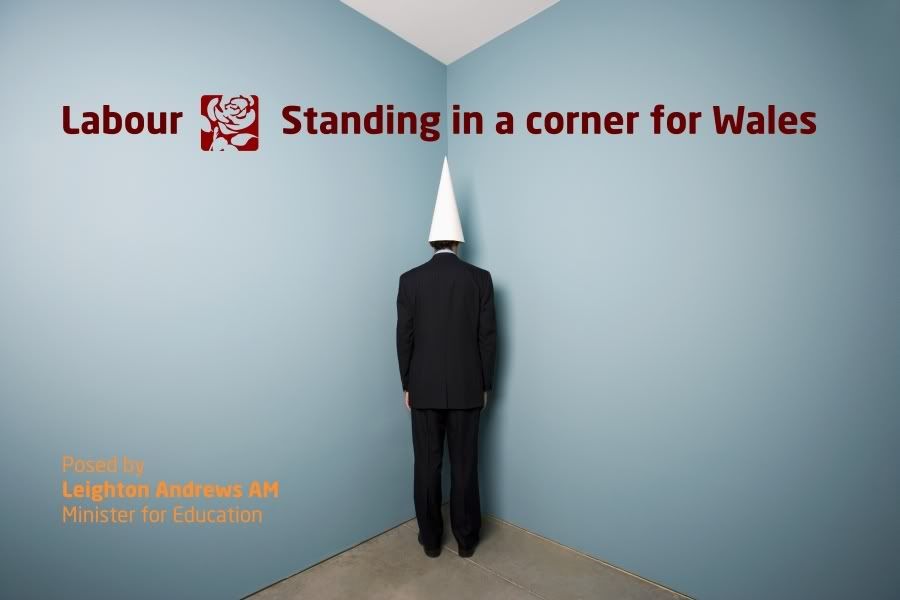
Click here and here for the pdfs, and here and here for the hi-res images.

Today saw the culmination of a series of unofficial referendums on independence for Catalunya which started in September 2009 in the small town of Arenys de Munt. I've written about them before here, here, here and here.
Further rounds have been held since then which I didn't write about. Thinking back, it was probably because of a sense of disappointment that the turnouts were getting progressively lower as referendums were held in the larger towns and cities. Turnout is the critical factor because the percentage of people who vote Yes is usually about 95%. People who didn't want independence didn't vote No, they just ignored the poll ... as did those who didn't care one way or the other about independence, or did have an opinion but didn't think the vote mattered, for the polls have been entirely unofficial.
It seemed reasonable to conclude that the appetite for independence was stronger in smaller towns; but that in the cities, with their significantly larger proportions of immigration from Spain and other countries, there might be less of a Catalan identity and therefore less appetite for independence.
For an account of what happened, I could do no better than quote directly from the Barcelona Decideix site:
On September 13th, 2009, the inhabitants of the Catalan town of Arenys de Munt voted in a referendum proposing Catalan independence from Spain. The terms of the question that was asked in the poll were: “Do you agree that Catalonia should become a social, democratic and independent state in its own right, as a member of the European Union?” About 40% of the town’s 6,500 eligible voters participated in the poll and more than 96% of votes were in favour of Catalan independence ...
On December 13th, 2009, 167 towns held a referendum on the same terms as the Arenys de Munt consultation. About 28% of the 700,000 eligible voters participated in this first massive wave of referendums, and 95% voted Yes to independence. Organized privately, with almost no media coverage, and based on volunteer work, these results were a great success. Even large towns close to Barcelona, such as Sant Cugat, had a high turnout (25%) and a clear result in favor of independence (92.3%).
The second wave of referendums took place on February 28th, 2010, when another group of 80 towns organized their referendums. 21.5% of the 300,000 eligible voters participated, and 92% voted Yes. The third wave took place on April 25th, 2010, when 213 towns organized the referendum and 1.3 million citizens were eligible voters. Two of the cities where the referendum was held had a population of over 100,000 inhabitants (Lleida and Reus); four between 50,000 and 100,000 (Girona, Manresa, Granollers and Mollet); and two between 30,000 and 50,000 (Igualada and Figueres). The turnout was around 18%. On June 20th a fourth wave was held, this time mainly in large cities located in the Barcelona metropolitan area. The majority of the population in these centres issues from the first massive migration wave of the 1960s, and many people have Spanish origins. The turnout was 14%.
Barcelona Decideix
But the news has just been announced that the turnout in Barcelona was 21.37%. This is an amazing result and a complete reversal of the trend. The organizers had thought that a good result would be to get over 10%.
10A Barcelona Referendum makes history with 21.37% turnout
“We could never, even in our wildest dreams, have imagined a turnout like this”. Alfred Bosch, the Barcelona Decideix spokesman, was visibly moved as he announced the final turnout figure in the Referendum on Independence for Catalonia in the city of Barcelona. “We’ve made history."
So how do we explain what has happened? This is how I see it. Events last year were dominated by the elections to the Catalan Parliament in November. There was a concerted effort to make independence the crucial issue in the election, and to elect enough deputies with a pro-independence mandate to make a unilateral declaration of independence. But party squabbles frustrated that idea and it fell spectacularly flat.
The people of Catalunya were really much more interested in normal politics, wanting to get rid of the broad left coalition—made up of the socialist PSOE, the pro-independence ERC (Plaid Cymru's sister party in the EFA) and the left-green ICV—in favour of CiU, the centre-right nationalist party that has traditionally been pro-autonomy but not pro-independence. CiU won 62 of the 135 seats, which was quite enough to form an effective minority government.
From CiU's perspective, they were much more interested in getting into government than to press for a change in Catalunya's constitutional position. Of course that's not to say they didn't want things to change, but the main change they had in mind is to get the same sort of financial arrangements for Catalunya as the Basque Autonomous Community and Navarre already enjoy. Those two communities collect their own taxes directly and hand over a negotiated sum to Madrid in a quasi-federal arrangement. But Madrid collects Catalunya's taxes centrally and hands them the equivalent of Wales' and Scotland's block grant. As Catalunya is wealthy, it gets back a lot less than it contributes. 10% of its GDP is syphoned off.
Parallel to this, Spain is not exactly in a healthy financial position, and is probably next in the queue for an EU loan package now that Portugal has had to take one. This is a time of severe cutbacks, unemployment and austerity measures, so it is hardly surprising that there is considerable friction between Spain and Catalunya, with Catalans asking why they should take more of a hit than they deserve for the sake of Greater Spain.
Therefore the increase in support for independence shown in this referendum is probably a reflection of rising discontent at the way Spain treats Catalunya as if it were a cash cow.

But on top of this, there seems to be a growing realization within CiU that its traditional position of greater autonomy within Spain is not likely to be realized. Things point to Spain wanting to recentralize rather than move towards becoming a federal state. So it is very significant that Jordi Pujol, the former Catalan President and grand old man of Catalan politics shifted his position and has voted for independence in this referendum. People were able to vote in advance, and him doing so undoubtedly had an effect on the high turnout today.
More important still is that Artur Mas, the leader of CiU and current Catalan President, voted for independence too. This opens the very real possibility that CiU will change its position from being pro-autonomy to pro-independence. As I noted in this post, an opinion poll in 2009 showed that 56.5% of CiU voters would vote for independence, with only 29.8% against; so changing the party's stance on independence would do it more good than harm.
All in all today has been a very positive day for those who want to see an independent Catalunya. I can't wait to see what happens next.
With a hat tip to Paul Flynn, I'd like to draw people's attention to a new website set up to demonstrate why Britain, and of course Wales, does not need a new generation of nuclear power plants. Click the image:
Most regular readers of Syniadau will know that I am against nuclear power in Wales, but might also have noticed that I have not taken advantage of the ongoing crisis at Fukushima to make an argument against nuclear power based on understandable but largely unreasonable fears. For me, the reasons for being against nuclear power in Wales would be the same whether a large earthquake and tsunami had hit the east coast of Japan or not.
On a world scale, nuclear might still be part of the answer. I would agree with George Monbiot that it is far better for countries like China or India to generate the ever-increasing amount of electricity they need from nuclear power rather than from fossil fuels such as coal. My argument is simply that neither Wales nor Britain as a whole needs it.
Put simply, we can generate more than twice as much electricity as we need from the renewable sources we have in abundance, and can use renewables to meet our entire fuel needs, including transport and heating. Although Wales and Scotland have the lion's share of renewable resources on and around this island, Britain as a whole can do without nuclear, as I noted in this post on the Zero Carbon Britain report last June.
I'm pleased to say that the No Need for Nuclear site—at least what I have seen by skimming though it—puts the case against nuclear in rational way that relies on research and hard evidence. Yet would be foolish not to admit that Fukushima has brought nuclear power to the forefront of political debate, and foolish not to take advantage of the fact that the public are now more interested in the nuclear debate than they otherwise would be. We were in danger of passively resigning ourselves to nuclear power because successive UK governments were not doing enough to make the alternatives a reality ... now we have a much better chance of showing that there is a better way. Take this opportunity. Sign up.
It was probably a repeat, but I happened to see a Daily Politics debate on AV in the early hours of this morning. The standard of debate was terrible; although that was due in no small part to the chairman, Andrew Neil, wanting to have much more of a say than those who were putting the case either for or against. The whole debate is available here on iPlayer, but I want to highlight this closing argument in favour of AV by Tessa Jowell.
The points she starts with are good, but she goes on to make the claim that AV will mean that an MP ...
would have to be elected by at least 50% of all those that are eligible to vote
This is completely untrue. What she probably meant to say was that an MP would have to be elected by 50% of those who do vote, because many of those who are eligible to vote don't do so. It might just be excusable if she had said it in the heat of debate, but this was a prepared closing statement. There are no excuses for her getting it so wrong.
And others who support AV make similar basic mistakes. Peter Hain might think he's getting it right when he says—as he does nearly every time he speaks on the issue—that under AV a candidate would need to be elected by at least 50% of those who vote (as opposed to those who are eligible to vote) ... but he's wrong too, and he has no excuse either.
-
So let me try to explain what they should be saying in a better way. The best way of thinking of AV is as a series of rounds in which the candidates who get least support get knocked out of the contest one by one. As an idea, there's absolutely nothing new, unusual or difficult to understand about this way of voting. It's the way nearly every talent contest on television works, for example, and it's even the way contests to decide the leader of the Conservative Party work. This is somewhat ironic, given that nearly all Tory MPs don't want ordinary voters to be able to do what they themselves already do ... but that's another story.
AV is a way of asking the question: "Who would you most like to see elected as your MP?" ... but with the follow-up question: "If s/he were knocked out of the contest, who would you like to see elected instead?" ... and with that question asked as many times as there are rounds in the contest.
The whole point is to allow voters more choice.
• If people who are eligible to vote don't want to, they don't have to. It's their choice.
• Those who do vote can express, in order, their preference for only one candidate, some candidates, or even all of the candidates. It's their choice.
• But if all the candidates they express a preference for have been eliminated, then their vote no longer counts. They have effectively abstained from any further rounds.
As an example of how this works in practice, Radio 5 Live conducted a dry-run election a couple of weeks ago which I read about on Guido Fawkes' blog. The results are shown in this table:
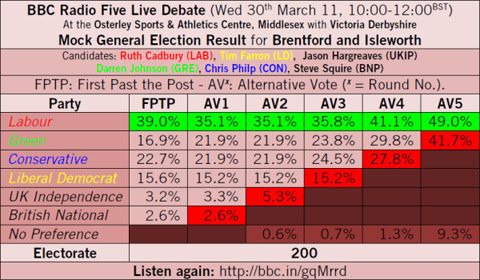
There were candidates from six parties standing. In the first round the BNP candidate was eliminated because he had the lowest vote. So the second preferences of the 2.6% who voted BNP were transferred to their second choice. Unsurprisingly, most of them put UKIP second, pushing up UKIP's share of the vote from 3.3% to 5.3%. But some of those who voted BNP did not express any other preference, so 0.6% effectively abstained from the rest of the contest.
In the second round the UKIP candidate had the lowest share of the vote, and was therefore knocked out. His 5.3% of the vote was split so that 3.6% went to the Tory candidate, 1.9% went to the Green and 0.7% went to Labour. But 0.1% expressed no other preference, or had expressed only a second preference for the BNP candidate who had already been knocked out.
Third time round, the LibDem candidate had the lowest share of the vote. So his 15.2% went to the second preferences of those who had ranked him first (and would have gone to the third preferences of any who had put him second after UKIP, and to the fourth preferences of any who had put him third after the BNP and UKIP ... although in this election nobody actually did either).
-
At this point it is perhaps worth commenting on one of the more misleading pieces of misinformation (why beat about the bush, lies) put out by the No to AV campaign. They would have people believe that it is unfair that those who put the BNP, UKIP or LibDems at the top of their list of preferences are now getting their vote counted two, three or even four times.
Well they are ... but that's equally true for everybody else.
Those who gave their first preference to candidates who are still in the contest have been getting their vote counted in every round too. Their vote counts just as much—no more and no less—than the vote of someone whose first choice was for the BNP, UKIP or LibDems. If somebody thinks this is unfair, we simply need to go back to the example of the TV talent contest or Tory leadership contest. If you vote for someone who is knocked out in the first or second round, that doesn't mean you're disqualified from voting for one of the remaining contestants in future rounds, does it? Nor does it mean that your opinion should now be worth less than the opinion of everyone else. In AV the opinion of every voter carries the same weight in every round.
-
But back to the contest. The 15.2% share of the LibDem candidate is now distributed according to the second preferences of those who had put him first. 6.0% goes to the Green, 5.3% to the Labour candidate and 3.3% to the Tory. 0.6% either had no other preference, or had only listed candidates who were knocked out in earlier rounds.
As a result of this, the Green candidate moves ahead of the Tory. This isn't in any way unfair to the Tory, it just means that given a three way choice between Labour, the Greens and the Tories, more voters prefer the Labour and Green candidates to the Tory. In a different constituency, it might well be another way round.
So for the final round, the second preferences of those who had put the Tory candidate first (together with the next preferences of those who had ranked the Tory below the LibDems, UKIP or BNP) are counted. 7.9% of the 27.8% went to the Labour candidate and 11.9% went to the Green; but 8% of those whose preferences included the Tories expressed no preference for either the Labour or the Green candidate.
This means that the Labour candidate won with 49.0% of the vote, against the Green candidate's 41.7%. In total 9.3% of those who voted did not have a preference for either of the two ... which is fair enough. AV leaves the choice entirely in the hands of each individual voter. Under AV nobody is forced to make a choice they don't want to make.
-
This dry run election shows why Peter Hain and others who claim that AV will mean that a candidate has to get at least 50% of the vote are talking rubbish. But that isn't the fault of AV ... it's just Peter Hain's inability to understand or explain it properly.
My point is that both Tessa Jowell and Peter Hain are not doing the Yes to AV campaign any good by misrepresenting it. In fact they're probably doing more harm than good.
To see why, just look at Guido Fawkes' post about it, here. The poor man can barely contain his glee, because he thinks that not getting 50% of the vote has somehow invalidated the result. Here are some extracts:
The BBC’s two hour attempt to sell AV to the listeners of Radio 5 backfired spectacularly
It didn’t work
The winning candidate could not get over 50% of the vote, rendering the whole basis for the change useless. The election would have been void.
The flawed result
It goes without saying that he has deliberately taken hold of the wrong end of the stick, for this doesn't invalidate the result at all. Quite the opposite, it shows how AV works and why it's fairer than FPTP. What we're seeing is merely another part of the stream of misinformation and blatant lies currently being put out by the No to AV campaign. And done with a professionalism that makes True Wales look like pussycats ... or should that be a cuddly inflatable pig?
I have to admit to not being fond of the way that political parties interact with the media before a general election. Policy tends to get broken down into bite-sized chunks that will fit into a one column story or a two minute video clip on the news. There is no room for any detail.
Plaid Cymru is as much prone to this as any other party. On Wednesday we were presented with "Four election pledges for a better Wales" and one of these was:
Plaid wants to halve the number of children leaving primary schools with inadequate literacy and numeracy by 2016 and end it by 2020 - a pledge the party says will cost £9 per pupil a year.
To end illiteracy within ten years at a cost of only £9 per child per year ... you'd need to be mad not to jump at the idea. It would still be worth doing if it cost ten times that much. But you'd need to be equally mad to think that it was as simple as handing over a ten pound note at the start of each school year.
So where's the detail? The first port of call should be Plaid's own website, for even if it's unreasonable to expect the media to report all the detail, I would at least expect to find the details there. But this is the page, and there's no detail to be found anywhere on it, not even a link to a place where it can be found. Instead we just have soundbites about "raising the game" and "stepping up to the plate". This is not good enough.
Now I don't want to pre-empt some dramatic announcement about the details of this policy, for I don't actually know what they are. But I've got a pretty good idea of what they should be, because I know of only one proven example of eradicating illiteracy at such a low cost.
-
In 1997, West Dunbartonshire Council in Scotland embarked on a programme to eradicate illiteracy within ten years, and they succeeded. A good description of how they did it appeared in this report in the Guardian in 2007:
Sounds incredible
Once upon a time, in a deprived part of Scotland, a plan was put into place to wipe out pupil illiteracy within a decade. Ten years on, it's worked.
When the project was launched, West Dunbartonshire had one of the poorest literacy rates in the UK, with 28% of children leaving primary school at 12 functionally illiterate - that is, with a reading age of less than nine years and six months. Last year, that figure had dropped to 6% and, by the end of this year, it is expected to be 0%.
In all, 60,000 children have been assessed, and evaluations show that children now entering primary 3 have an average reading age almost six months higher than previous groups. In 1997, 5% of primary school children had "very high" scores on word reading; today the figure is 45%. Across the UK, it is estimated that 100,000 pupils a year leave school functionally illiterate.
So why didn't everybody else jump at the idea? We'll actually they did ... but, they picked up on the headline issues without understanding why it worked.
The headline idea is synthetic phonics, and the Labour government jumped on it with a vengeance. But it is a huge mistake to think that initiatives of this sort can simply be dictated by a government minister. We cannot say "teach synthetic phonics" as if it were some sort of magic bullet. To illustrate that, I'd like to draw people's attention to a report by Tom Burkard where he says:
West Dunbartonshire shows that more central control is not the solution to the country’s educational problems. Indeed, it is the problem. The power of a successful example – such as West Dunbartonshire – can do more than yet more well-intentioned but inevitably doomed top-down government edicts.
A World First for West Dunbartonshire - The elimination of reading failure
And it is in this respect that Plaid, with its inbuilt commitment to the principle of decentralization, has a much better perspective than has been shown by Labour ... a party that seems always to think that things can be solved by setting out more and more new sets of standards which schools are then expected to adhere to. The Welsh government should enable, by drawing attention to good practice and by providing the appropriate resources, not dictate.
The report goes on to say that the problem of functional illiteracy needs to be addressed in more than one context:
The success of the West Dunbartonshire Literacy Initiative can be attributed to three factors:
• Firstly, there is the political context. Schools and local authorities in Scotland are largely free from the centralised managerialism that afflicts schools in England. Although the West Dunbartonshire Literacy Initiative has received the full support of the Scottish Executive, most of the important decisions have been made at a local level.
• Secondly, there is the administrative context. Successful innovation has relied on co-operation, not coercion. Dr Tommy MacKay, the driving force behind the West Dunbartonshire programme, has gained the confidence of everyone in West Dunbartonshire – from council leaders and officials down to school dinner ladies. As an outside contractor, he has not had any power to tell people what to do and has achieved change by inspiration and the power of ideas.
• Lastly, there is the educational context. In England and Wales, it is assumed that 20% of children will have ‘special needs’ – usually meaning that they cannot read and write. Faced with a child who is slow to learn to read, teachers and psychologists tend to think in terms of what is wrong with the child – and not what is wrong with the teaching. This cycle of low expectations and reading failure can be broken.
One sentence in particular is worth repeating:
Faced with a child who is slow to learn to read, teachers and psychologists tend to think in terms of what is wrong with the child – and not what is wrong with the teaching.
Now there are some things in the report which aren't quite right, in particular the way that it treats England and Wales together. Yet it should surely be obvious that if Scotland can do what England cannot, then there is no reason why we in Wales shouldn't follow them.
-
As I said, I do not know what Plaid politicians are going to say when they are asked to give details of how Wales should tackle the problem of illiteracy. I only hope the answer they give will be along these lines.
![]()
Update - 10:30, 8 April 2011
John Dixon has just left a comment reminding me that Nerys Evans was interviewed by the Western Mail in January, and specifically referred to the West Dumbartonshire Literary Initiative as a model for what Plaid are proposing. This is from the article:
Key proposals include:
• a comprehensive “synthetic phonics” programme for all children going through the three-to-seven foundation phase
• a safety-net programme during the eight-to-13 phase for those who by the age of seven, need extra and intensive tuition
• efforts to change attitudes to reading so it is not just seen as a school activity or associated with homework.
So I'm sorry for not having remembered this. I only wish that there was an obvious link to a place on the Plaid website where such information was available so that I didn't need to rely on John's memory.
I want to say again that I'm not singling out Plaid, for doing politics by press release and couple of appropriate quotes to a reporter is something done by all parties. It's a format that the media can easily digest and respond to. But I expect more from Plaid than from other parties.
In just the same way as Madoc Batcup's article here and on ClickOnWales explained the thinking behind the Build for Wales proposal—something that was badly needed because the media quite obviously didn't really understand what it was about—I would want something similar for this proposal on literacy, and for Plaid's other manifesto promises too. If Nerys or someone in her research team wants to write such an article, I'd be glad to post it here on Syniadau.
Much of what will appear on this blog will also appear in the Syniadau Forums, but the emphasis on this blog is slightly different. The forums are focused more on the structures and institutions that Wales will need to develop in order to become a successful independent nation, arranged on a subject by subject basis, but the blog will have more of an emphasis on day to day political news and developments.
People are welcome to reply or leave comments either here or on the Syniadau Forums. If anyone wants to initiate a new subject they are very welcome to do so there.
![]()
![]()
![]()